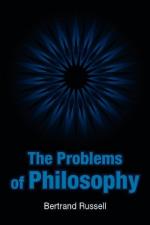|
This section contains 470 words (approx. 2 pages at 400 words per page) |

|
Chapter 5, Knowledge by Acquaintance and Knowledge by Description Summary and Analysis
Russell now examines the distinction between knowledge of things and knowledge of truths. He calls knowledge of things knowledge by acquaintance, and is simpler than knowledge of truths and independent of it. Knowledge by description is knowledge of truths. We have acquaintance with anything we are directly aware of without inference or knowledge of truths mediating. Knowledge of the table as a physical object is not direct knowledge but derived by acquaintance with the sense-data composing the appearance of the table. Acquaintance generates all knowledge of things and truths.
We are acquainted with sense-data but they are not the only things we are acquainted with, for otherwise we would know nothing about the past. Instead, we sometime are acquainted with abstract ideas or "universals." We sometimes extend...
(read more from the Chapter 5, Knowledge by Acquaintance and Knowledge by Description Summary)
|
This section contains 470 words (approx. 2 pages at 400 words per page) |

|




